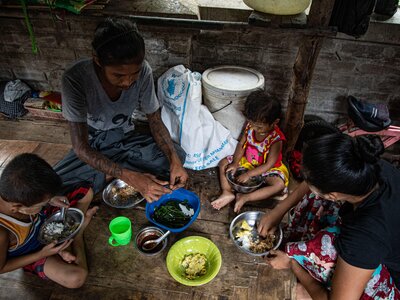Myanmar
- 15.2 million
- people were already food insecure prior to earthquake
- 3.5 million
- people displaced by conflict
- 54.1 million
- population
A 7.7-magnitude earthquake struck central Myanmar on 28 March 2025, killing more than 3,000 people, destroying infrastructure and reverberating through neighbouring countries.
The disaster compounds a humanitarian crisis linked to a multitude of political and socioeconomic challenges.
Conflict and political crises have reversed progress on ending hunger and malnutrition, with a majority of people struggling with physical, social and economic access to food. Women, girls, elderly people, persons with disabilities and minorities are particularly affected.
High levels of food insecurity are particularly prevalent in conflict-affected areas. At the same time, there are massive disruptions or slowdowns in sectors including banking, healthcare, education and transport.
A total of 3.5 million people have been displaced from their homes across Myanmar, including over 3 million since the military takeover in early 2021. Meanwhile, almost 1 million Rohingya refugees from Myanmar remain in Bangladesh.
Nearly one in four children under the age of 5 suffers from stunting (reduced height for their age), while wasting (underweight for their height) stands at 7 percent nationally. Tuberculosis and HIV infections are also high. Education remains inadequate at all levels, with the poorest households most at risk.
Myanmar remains one of the countries most vulnerable to climate-related disasters. The country was affected by several floods in 2024, including those caused by Super Typhoon Yagi which had a devastating impact on an estimated 1 million people across 11 of the country's 14 states/regions.
The World Food Programme (WFP) is providing food and cash to earthquake survivors, with plans to reach 850,000 people. We further provide life-saving food and cash assistance to internally displaced people and other vulnerable populations with little or no access to livelihoods. This support is threatened by severe funding shortfalls, however. WFP also responds to sudden-onset emergencies.
What the World Food Programme is doing in Myanmar
-
Crisis response
-
WFP has dispatched more than 100 metric tons of food from Yangon to Mandalay, Nay Pyi Taw, and Sagaing states following the devastating earthquake. We have over 200 metric tons of fortified biscuits available for immediate distribution, with an additional 7,000 metric tons of food stocks in-country to assist those hardest hit. WFP further provides life-saving food and/or cash assistance to people affected by conflict, crisis, inter-communal violence and climate-related disasters, as well as those who have limited or no livelihood options. WFP assists people displaced and/or affected by ongoing crisis in conflict-affected areas while sustaining support for highly food-insecure people in Kachin, Shan, Chin and Rakhine states, who live in prolonged displacement. Where needed, the monthly basic food basket is supplemented by fortified blended food to address malnutrition in mothers and children under 5. For sustainability and impact, WFP complements cash and food assistance with training for local partners – focusing on protection and conflict sensitivity, and ensuring the participation of women.
-
School meals
-
WFP’s school meals programme targets pre- and primary school students. Children receive midday biscuit snacks or on-site meals. Cooked meals, while mainly funded by WFP, also include ingredients contributed by parents and the community. WFP provides onsite feeding, where the schools and learning centres are safe and open, or take-home rations. This assistance is complemented by social and behavioural change communication, aimed at improving hygiene and eating habits among children and adolescents.
-
Asset creation and livelihoods
-
WFP implements community-based projects that create and or restore community assets and infrastructure such as feeder roads and land terracing. WFP provides a basic food basket or cash-based assistance, combined with nutrition messaging, to vulnerable people as they participate in the projects. These activities help communities achieve self-reliance, bolster resilience to stresses and shocks, and assist recovery from the impact of disasters. Working with community and local partners, WFP promotes inclusive participation and equal wages for women and men.
-
Nutrition
-
To improve nutrition and address wasting and stunting in children under 5 years of age, WFP provides children, adolescent girls, and pregnant and nursing women, with specialized nutritious foods or cash assistance, combined with a comprehensive nutrition package. Meanwhile, WFP hosts the UN Network for Nutrition in Myanmar, strengthening collaboration between UN agencies and other partners. WFP has also been engaging with food-related businesses in Myanmar to promote nutrition through the SUN Business network (SBN Myanmar), which was formed in 2020.
-
Food-by-prescription
-
To ensure nutritional recovery and treatment success, WFP provides people living with HIV and on antiretroviral therapy, as well as tuberculosis patients, with a food basket, specialized nutritious foods and counselling support. WFP delivers this assistance through HIV/TB clinics or food distributions, with partner organizations and outreach workers. WFP also supports with referrals to, and training for, providers of services for HIV and tuberculosis, working with other United Nations entities, NGOs and community-based organizations.
-
Humanitarian support services
-
As the lead agency for the Logistics Sector, WFP provides support and coordination to humanitarian partners in Myanmar. Most recently in 2024, this has included organising flights between Yangon and Sittwe in Rakhine State, to support the movement of humanitarian staff and supplies. WFP also provides on-demand services such as cash transfers, food transport and distribution, administration, information technology and warehouse storage.
Myanmar news releases
Go to pageFind out more about the state of food security in Myanmar
Visit the food security analysis pageContacts
Office
United Nations Building No. 20-25 Kyine Tone Street Zawana Theidi Quarter, Oattara Thiri Township Nay Pyi Taw, Myanmar
Nay Pyi Taw
Myanmar (Burma)






